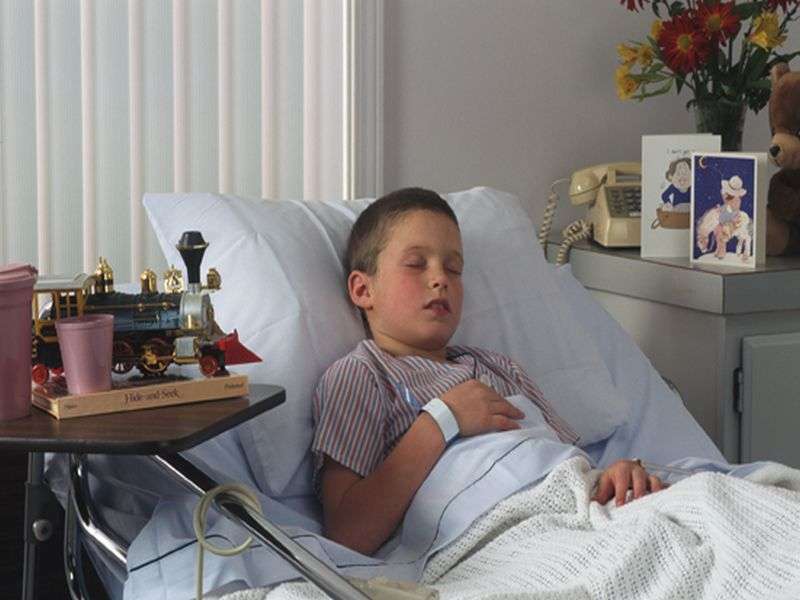(HealthDay)—When a bedside alarm goes off in a child's hospital room, anxious parents expect nurses to respond pronto.
That rarely happens, however, and a new study helps explain why.
Researchers found that nurses are usually quick to react when alarms are urgent. But, they're slower to respond at the end of the workday or when they suffer from "chronic alarm fatigue."
Also, having parents present doubled the response time on average, the study found.
But, delayed response time didn't threaten any of the 100 patients evaluated in the study, the researchers said. And just half of 1 percent of more than 11,000 alarms analyzed were deemed "actionable," or crucial.
"The nurses were overall doing a great job predicting which alarms were going to be important," said study lead author Dr. Christopher Bonafide, an assistant professor of pediatrics with the Children's Hospital of Philadelphia. "Their intuition was correct."
The high number of false alarms in U.S. hospitals has led to "alarm fatigue" among nurses. As a result, the Joint Commission—the organization that accredits American hospitals—issued new guidelines for managing alarm monitors.
The beeps and buzzes alert staff to medical problems facing patients such as high heart rates, dips in oxygen levels in the blood and dangerous heartbeat patterns, Bonafide said.
But, many false alarms are caused simply by babies moving around and disrupting sensors, he said.
"When an alarm goes off and the nurse is already in the patient's room, they can immediately look up, check on the patient, and make sure everything is OK," Bonafide said. "When a nurse isn't in the room, some hospitals like ours have the ability to send them a text message to the phone that they are carrying."
For this study, researchers analyzed video of 38 nurses caring for 100 patients at Children's Hospital of Philadelphia from 2014-2015.
Almost all of the 11,745 beeps and buzzes that sounded were valid. And 50 were deemed critical, "the important ones we would not want anyone to miss," Bonafide said. Nurses responded in about a minute, on average, to these alarms.
However, overall, half of the total alarms took 10.4 minutes or more to address, the study found.
Years on the job and caseload accounted for some differences in response time.
"Nurses with under one year of experience responded faster than nurses with one or more years' experience," Bonafide said. "Nurses taking care of just one patient responded faster than those caring for more than one patient. And for each hour that passed in a nurse's shift, their response time got a little bit slower."
Other factors appeared to contribute, too.
"If family members were absent from the bedside, response time was faster than if parents were there," he said. The median response time was six minutes when family members weren't there, and 12 minutes when they were.
Also, "more complex" patients got faster responses, Bonafide said. "And patients who had prior alarms that required interventions to be taken got faster responses than those who had not had those experiences."
Marjorie Funk, a professor at Yale University School of Nursing, praised the study. She said the findings shouldn't worry parents about leaving their child's side at hospitals.
"Alarms for serious events sound different, and nurses respond immediately," Funk noted. "Other alarms may require their attention, but they can finish what they are doing for another patient before responding or can ask a colleague to respond."
Bonafide said there are no guidelines that tell nurses how quickly they should response to various alarms. But, he thinks the system needs improvement.
"There's quite a lot we can do to improve the safety and performance of these systems and make them work for us and provide truly useful information that helps nurses identify patients who are getting into trouble," he said.
When a child is hospitalized, Bonafide and Funk agreed that it's appropriate for parents to ask questions. These might include asking physicians and nurses, "Why is my child being continuously monitored? What problems are you looking for?" and "What should I do if an alarm goes off?"
The study appears in the April 10 issue of JAMA Pediatrics.
More information: Christopher Bonafide, M.D., assistant professor, pediatrics, Children's Hospital of Philadelphia; Marjorie Funk, Ph.D., RN, professor, nursing, Yale University School of Nursing, New Haven, Conn.; April 10, 2017, JAMA Pediatrics.
For more about helping your child tolerate a hospital visit, see the University of Rochester Medical Center.
Journal information: JAMA Pediatrics
Copyright © 2017 HealthDay. All rights reserved.


















